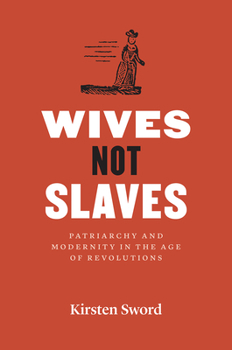Wives Not Slaves: Patriarchy and Modernity in the Age of Revolutions
Wives not Slaves begins with the story of John and Eunice Davis, a colonial American couple who, in 1762, advertised their marital difficulties in the New Hampshire Gazette--a more common practice for the time and place than contemporary readers might think. John Davis began the exchange after Eunice left him, with a notice resembling the ads about runaway slaves and servants that were a common feature of eighteenth-century newspapers. John warned neighbors against "entertaining her or harbouring her. . . or giving her credit." Eunice defiantly replied, "If I am your wife, I am not your slave." With this pointed but problematic analogy, Eunice connected her individual challenge to her husband's authority with the broader critiques of patriarchal power found in the politics, religion, and literature of the British Atlantic world. Kirsten Sword's richly researched history reconstructs the stories of wives who fled their husbands between the mid-seventeenth and early nineteenth centuries, comparing their plight with that of other runaway dependents. Wives not Slaves explores the links between local justice, the emerging press, and transatlantic political debates about marriage, slavery and imperial power. Sword traces the relationship between the distress of ordinary households, domestic unrest, and political unrest, shedding new light on the social changes imagined by eighteenth-century revolutionaries, and on the politics that determined which patriarchal forms and customs the new American nation would--and would not--abolish.
Format:Hardcover
Language:English
ISBN:022675748X
ISBN13:9780226757483
Release Date:April 2021
Publisher:University of Chicago Press
Length:408 Pages
Weight:1.54 lbs.
Dimensions:1.3" x 6.1" x 9.2"
Customer Reviews
0 rating





